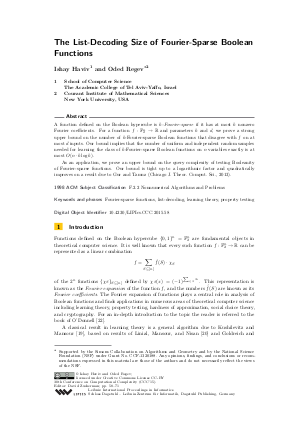The List-Decoding Size of Fourier-Sparse Boolean Functions
Authors Ishay Haviv, Oded Regev
-
Part of:
Volume:
30th Conference on Computational Complexity (CCC 2015)
Part of: Series: Leibniz International Proceedings in Informatics (LIPIcs)
Part of: Conference: Computational Complexity Conference (CCC) - License:
 Creative Commons Attribution 3.0 Unported license
Creative Commons Attribution 3.0 Unported license
- Publication Date: 2015-06-06
File

PDF
LIPIcs.CCC.2015.58.pdf
- Filesize: 449 kB
- 14 pages
Document Identifiers
Subject Classification
Keywords
- Fourier-sparse functions
- list-decoding
- learning theory
- property testing
Metrics
- Access Statistics
-
Total Accesses (updated on a weekly basis)
0Document
0Metadata
Abstract
A function defined on the Boolean hypercube is k-Fourier-sparse if it has at most k nonzero Fourier coefficients. For a function f: F_2^n -> R and parameters k and d, we prove a strong upper bound on the number of k-Fourier-sparse Boolean functions that disagree with f on at most d inputs. Our bound implies that the number of uniform and independent random samples needed for learning the class of k-Fourier-sparse Boolean functions on n variables exactly is at most O(n * k * log(k)). As an application, we prove an upper bound on the query complexity of testing Booleanity of Fourier-sparse functions. Our bound is tight up to a logarithmic factor and quadratically improves on a result due to Gur and Tamuz [Chicago J. Theor. Comput. Sci.,2013].
Cite As Get BibTex
Ishay Haviv and Oded Regev. The List-Decoding Size of Fourier-Sparse Boolean Functions. In 30th Conference on Computational Complexity (CCC 2015). Leibniz International Proceedings in Informatics (LIPIcs), Volume 33, pp. 58-71, Schloss Dagstuhl – Leibniz-Zentrum für Informatik (2015)
https://doi.org/10.4230/LIPIcs.CCC.2015.58
BibTex
@InProceedings{haviv_et_al:LIPIcs.CCC.2015.58,
author = {Haviv, Ishay and Regev, Oded},
title = {{The List-Decoding Size of Fourier-Sparse Boolean Functions}},
booktitle = {30th Conference on Computational Complexity (CCC 2015)},
pages = {58--71},
series = {Leibniz International Proceedings in Informatics (LIPIcs)},
ISBN = {978-3-939897-81-1},
ISSN = {1868-8969},
year = {2015},
volume = {33},
editor = {Zuckerman, David},
publisher = {Schloss Dagstuhl -- Leibniz-Zentrum f{\"u}r Informatik},
address = {Dagstuhl, Germany},
URL = {https://drops.dagstuhl.de/entities/document/10.4230/LIPIcs.CCC.2015.58},
URN = {urn:nbn:de:0030-drops-50600},
doi = {10.4230/LIPIcs.CCC.2015.58},
annote = {Keywords: Fourier-sparse functions, list-decoding, learning theory, property testing}
}
Author Details
References
-
Noga Alon, Tali Kaufman, Michael Krivelevich, Simon Litsyn, and Dana Ron. Testing Reed-Muller codes. IEEE Trans. on Information Theory, 51(11):4032-4039, 2005. Preliminary version in RANDOM'03.

-
Alexandr Andoni, Rina Panigrahy, Gregory Valiant, and Li Zhang. Learning sparse polynomial functions. In SODA, pages 500-510, 2014.

-
Khanh Do Ba, Piotr Indyk, Eric Price, and David P. Woodruff. Lower bounds for sparse recovery. In SODA, pages 1190-1197, 2010.

-
Anna Bernasconi and Bruno Codenotti. Spectral analysis of Boolean functions as a graph eigenvalue problem. IEEE Trans. on Computers, 48(3):345-351, 1999.

-
Arnab Bhattacharyya. Guest column: On testing affine-invariant properties over finite fields. SIGACT News, 44(4):53-72, 2013.

-
Arnab Bhattacharyya, Swastik Kopparty, Grant Schoenebeck, Madhu Sudan, and David Zuckerman. Optimal testing of Reed-Muller codes. In FOCS, pages 488-497, 2010.

-
Avrim Blum. Learning a function of r relevant variables. In COLT, pages 731-733, 2003.

-
Jean Bourgain. An improved estimate in the restricted isometry problem. In Geometric Aspects of Functional Analysis, volume 2116 of Lecture Notes in Mathematics, pages 65-70. Springer, 2014.

-
Jehoshua Bruck and Roman Smolensky. Polynomial threshold functions, AC⁰ functions, and spectral norms. SIAM J. Comput., 21(1):33-42, 1992. Preliminary version in FOCS'90.

-
Emmanuel J. Candès and Terence Tao. Near-optimal signal recovery from random projections: Universal encoding strategies? IEEE Trans. on Information Theory, 52(12):5406-5425, 2006.

-
Mahdi Cheraghchi, Venkatesan Guruswami, and Ameya Velingker. Restricted isometry of Fourier matrices and list decodability of random linear codes. SIAM J. Comput., 42(5):1888-1914, 2013. Preliminary version in SODA'13.

-
Oded Goldreich and Leonid A. Levin. A hard-core predicate for all one-way functions. In STOC, pages 25-32, 1989.

-
Parikshit Gopalan, Ryan O'Donnell, Rocco A. Servedio, Amir Shpilka, and Karl Wimmer. Testing Fourier dimensionality and sparsity. SIAM J. Comput., 40(4):1075-1100, 2011. Preliminary version in ICALP'09.

-
Tom Gur and Omer Tamuz. Testing Booleanity and the uncertainty principle. Chicago J. Theor. Comput. Sci., 2013, 2013.

-
Ishay Haviv and Oded Regev. The restricted isometry property of subsampled Fourier matrices, 2015. Manuscript.

-
Stasys Jukna. Extremal Combinatorics: With Applications in Computer Science. Texts in theoretical computer science. Springer-Verlag, second edition, 2011.

-
Tali Kaufman, Shachar Lovett, and Ely Porat. Weight distribution and list-decoding size of Reed-Muller codes. IEEE Trans. on Information Theory, 58(5):2689-2696, 2012. Preliminary version in ICS'10.

-
Murat Kocaoglu, Karthikeyan Shanmugam, Alexandros G. Dimakis, and Adam R. Klivans. Sparse polynomial learning and graph sketching. In NIPS, pages 3122-3130, 2014.

-
Eyal Kushilevitz and Yishay Mansour. Learning decision trees using the Fourier spectrum. SIAM J. Comput., 22(6):1331-1348, 1993. Preliminary version in STOC'91.

-
Nathan Linial, Yishay Mansour, and Noam Nisan. Constant depth circuits, Fourier transform, and learnability. J. ACM, 40(3):607-620, 1993. Preliminary version in FOCS'89.

-
Elchanan Mossel, Ryan O'Donnell, and Rocco A. Servedio. Learning functions of k relevant variables. J. Comput. Syst. Sci., 69(3):421-434, 2004. Preliminary vesion in STOC'03.

-
Ryan O'Donnell. Analysis of Boolean Functions. Cambridge University Press, 2014.

-
Mark Rudelson and Roman Vershynin. On sparse reconstruction from Fourier and Gaussian measurements. Comm. Pure Appl. Math., 61(8):1025-1045, 2008.

-
Madhu Sudan. Invariance in property testing. In Property Testing - Current Research and Surveys, volume 6390, pages 211-227. Springer, 2010.

-
Gregory Valiant. Finding correlations in subquadratic time, with applications to learning parities and juntas. In FOCS, pages 11-20, 2012.

